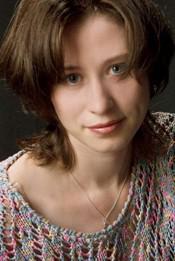Dichter
Halyna Krouk

Halyna Krouk
(Oekraïne, 1974)
Biografie
Born in Lviv, Ukraine, Halyna Krouk is a poet, writer of fiction and a researcher in Ukrainian medieval literature. She has written three poetry books, been published widely in literary journals and has won two international literary awards. In 2003 she received the Gaude Polonia Fellowship grant presented by the Polish Minister of Culture.
Her third book of poetry was not to appear until seven years later. During this “poetic silence” Krouk gave birth to her son (“I couldn’t write while pregnant”) and started to write children’s poetry and fiction, which she published in children’s magazines and anthologies. In 2003 she won the Step by Step international competition for children’s books. Her Marko mandruje navkolo svitu (Marko Travels Around the World) and Vazhko buty najmenshym (It’s Hard to Be the Youngest) have been translated into 15 languages.
In 2001 she defended her Ph.D. thesis on ‘Ukrainian low baroque: poetics of style and genre’ and started teaching foreign literature at Lviv State University. At about the same time she began to write prose. Besides writing short stories she began an e-mail correspondence with the Lithuanian writer, Sigitas Sjudika, which later became the seed for the novel she is currently working on:Liubyty dal’nioho, liubyty blyzhnioho (Loving the Distant, Loving the Close). This is concerned with a topic that seems to be crucial in Krouk’s writing: What is ‘feminine’ and what is ‘masculine’? And to what extent does gender inform a personality and a person’s relations with others?
Krouk herself believes that she sees “only people; gender is a secondary matter”. But poems in her last book Oblychchia poza svitlynoju (The Face beyond the Photograph) suggest quite the opposite. They convey the impression that Halyna, who writes “only when it is impossible not to write, when it feels so bad that there’s no other way to digest the situation”, tries to persuade herself that she is not a woman. Because she is a poet – and “poets don’t have gender”.
However, each line of her poems is written by a woman. Not by a person who declares that she’s a woman. The author of these poems simply is a woman, because that’s the only way she can exist, because “the woman, you know, is a stubborn soul”. She is always wanting “the other the Other”, trying to escape “through the knife’s narrow cut”, since “everywhere [is] foreign land and her language no one understands”. She is also a human being. And her “throat [is] raw from shouting/ between the legs”.
© Kateryna Botanova
BibliographyPoetry
In Ukrainian
Mandry u Poshukakh Domu (Journeys In Search of Home), 1997.
Slidy na Pisku (Footprints on Sand), 1997.
Oblychchia poza svitlynoju (The Face beyond the Photograph), 2005.
In anthologies
In Ukrainian
Ptyvitannia Zhyttia (Greeting Life), 1996.
Pochatky (Beginnings), 1998.
Protyznachennia (Against meaning), 2001.
Korolivskyj Lis (The Royal Forest), 2001.
Children’s fiction
In Ukrainian
Marko Travels Around the World, 2003.
It’s Hard to Be the Youngest, 2003.
Links
In Ukrainian
UAZone
Poetry
Ji
Short stories
Polish-Ukrainian arts magazine
Interview
Dzyga
Interview
Moloda Ukraina (Young Ukraine) magazine
Personal page
Gedichten
Gedichten van Halyna Krouk
Sponsors
























